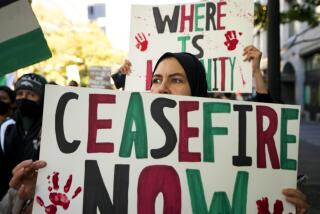America’s ‘Islamist dilemma’
Egyptian President Hosni Mubarak’s promise on Tuesday that he will not stand for reelection in September was too little, too late. The Egyptian regime is fatally wounded, with protesters demanding nothing less than a complete break with the past. Mubarak may not relinquish power tomorrow, but his days are numbered. And the government that replaces him is likely to include the Muslim Brotherhood, the world’s oldest Islamist movement as well as one of its most feared.
In the coming days, the prospect of the Brotherhood’s rise is likely to be one of the big stories out of Egypt. Alarm about this prospect is already being sounded in the West. Secretary of State Hillary Rodham Clinton recently cautioned, “We also don’t want to see some takeover that would lead not to democracy but to oppression and the end of the aspirations of the Egyptian people.”
More recently, the White House said it was open to a Brotherhood role in a future government, provided the group renounces violence and commits to the democratic process. But these caveats indicate that the U.S. is still nervous — and not very knowledgeable — about the actual nature of the group, which satisfied both of President Obama’s conditions decades ago.
Once again, the U.S. and its allies find themselves embracing the idea of democracy but not necessarily its outcomes. America is still grappling with its “Islamist dilemma.” In 1992, the U.S. tacitly supported a military coup in Algeria that overturned a democratic election in which an Islamist party had gained a majority of the seats in parliament. The coup ended what was, at the time, the most promising democratic experiment in the Arab world. More recently, the George W. Bush administration buried its own “freedom agenda” after Islamists did surprisingly well in elections in the region, including in Egypt.
The fear of Islamists coming to power has long paralyzed U.S. policy. This has prevented bold American leadership in situations where it could have played a decisive role. Today, during the largest pro-democracy protests in Egyptian history, this same fear threatens to derail U.S. policy once again. Despite some nods to the demonstrators from the Obama administration, Egyptians still see the U.S. as holding out hope that the Egyptian regime, long a stalwart ally, might survive, reconstituting itself in a new guise.
Senior American officials have called on Mubarak to take “concrete steps” toward change and to initiate a “national dialogue.” And Obama said Tuesday that he had spoken directly to Mubarak of the need for an orderly transition, starting immediately, to a democratically elected Egyptian government. But the hundreds of thousands of protesters holding forth in Tahrir Square have moved well beyond such talk. Their insistent call, made with unmistakable clarity, is for Mubarak to step down immediately, something Obama has so far refused to specifically endorse.
To be fair, Western powers have reason to worry that a democratic government in Egypt will be less amenable to their security interests. The Muslim Brotherhood has said it has no leadership aspirations. However, the group, known for its inflammatory anti-Israel rhetoric, is likely to be part of a broad-based national unity government.
But Westerners should not lose sleep over the Brotherhood’s inclusion. A pragmatic organization at its core, the group will avoid getting tied up in foreign policy, knowing that this might cause the international community to withdraw support. Also on the line is $1.5 billion in annual U.S. assistance, an amount Egyptians will need even more after the devastation of their economy in the past week.
That said, with or without the Brotherhood, a democratic government will reflect popular preferences, and it happens to be the case that most Egyptians, secular and Islamist alike, share a rather pronounced dislike of Israel. This may introduce some tensions between Egypt and Israel, but it will not threaten the peace treaty the two countries signed more than three decades ago. Egyptian opposition figures across the political spectrum know this is a line that cannot be crossed.
In any case, it is impossible to have everything all at once. There will be tradeoffs. Some tradeoffs are worth it. More democracy in Egypt may give the U.S. headaches. But if Mubarak tries to cling to power in the coming weeks and months — against the wishes of hundreds of thousands of defiant, determined Egyptians — the U.S. will have a far larger problem. America will always have an “Islamist dilemma.” But it can be managed. Egypt is a good place to start trying.
Shadi Hamid is director of research at the Brookings Doha Center and a fellow at the Saban Center for Middle East Policy at the Brookings Institution.
More to Read
A cure for the common opinion
Get thought-provoking perspectives with our weekly newsletter.
You may occasionally receive promotional content from the Los Angeles Times.










